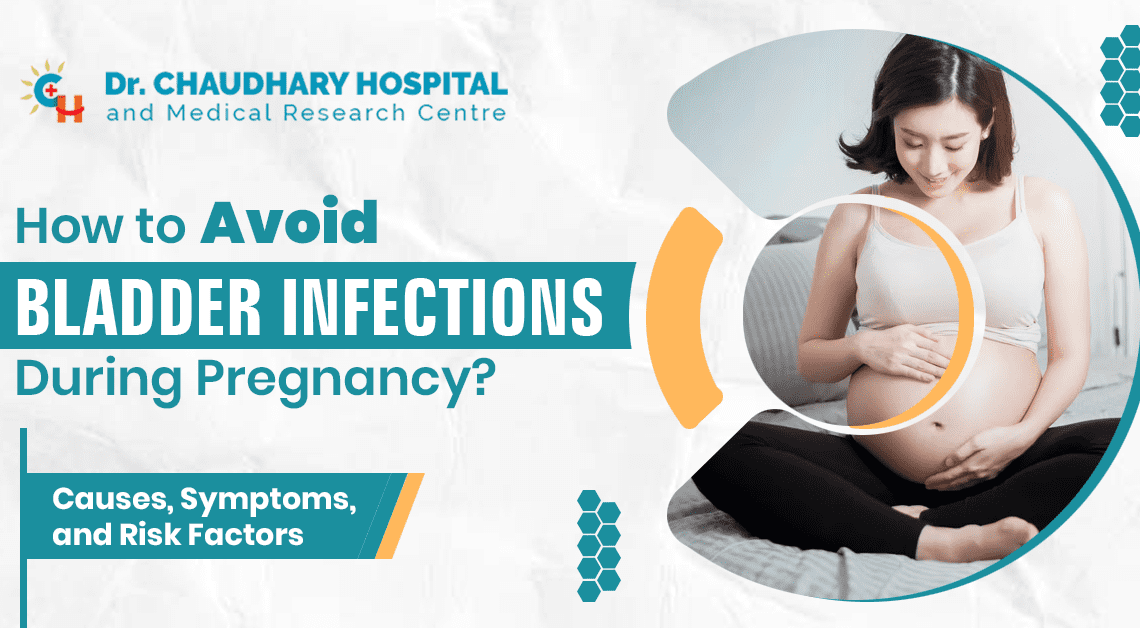Pregnancy is a beautiful and transformative journey for women, but it also brings about certain challenges and health concerns. One such concern is the increased susceptibility to bladder infections or urinary tract infections (UTIs). These infections can cause discomfort and potentially lead to complications if left untreated. In this blog, we will explore the causes, symptoms, and risk factors associated with bladder infections during pregnancy. Additionally, we will provide essential tips to help expecting mothers prevent and manage UTIs effectively.
What is a Bladder Infection?
A bladder infection is a type of urinary tract infection (UTI). This refers to an infection anywhere in the urinary tract, such as the:
- Bladder
- Kidneys
- Ureters
- Urethra
The kidneys and ureters are a part of the upper urinary tract. Urine is created when the kidneys filter the blood to remove waste. Urine is transported to the lower tract by the ureters.
The bladder and urethra are parts of the lower tract. Urine is held in reserve by your bladder until you’re ready to let it out. The urethra is the passageway where urine leaves the body.
Since germs can reach the lower tract more easily, UTIs are more common there.
Causes of Bladder Infections during Pregnancy
Bladder infections occur when bacteria enter the urinary tract and multiply, leading to inflammation and infection. During pregnancy, several factors contribute to the increased likelihood of developing a bladder infection:
Hormonal changes – Pregnancy hormones can alter the urinary tract, making it more susceptible to infections.
Urinary stasis – As the uterus expands, it can exert pressure on the bladder, inhibiting complete bladder emptying and promoting bacterial growth.
Weakened immune system – Pregnancy naturally suppresses the immune system to prevent the body from rejecting the developing fetus. However, this also makes pregnant women more vulnerable to infections, including bladder infections.
Symptoms of Bladder Infections during Pregnancy
Identifying the symptoms of bladder infections during pregnancy is crucial for prompt diagnosis and treatment. Common signs and symptoms include:
- Increased frequency and urgency of urination.
- Burning sensation or pain during urination.
- Cloudy, dark, or foul-smelling urine.
- Pelvic discomfort or pressure.
- Blood in the urine (hematuria).
- Mild fever or chills.
If you experience any of these symptoms, it is important to consult your healthcare provider for a proper diagnosis and appropriate treatment.
Risk Factors for Bladder Infections during Pregnancy
Certain risk factors can heighten the chances of developing bladder infections during pregnancy:
Previous UTIs – If you’ve had a bladder infection in the past, your likelihood of recurrence is higher during pregnancy.
Urinary tract abnormalities – Structural irregularities in the urinary tract can obstruct the flow of urine and increase the risk of infections.
Sexual activity – Sexual intercourse can introduce bacteria into the urinary tract, increasing the chances of infection. However, it’s essential to maintain a healthy sexual relationship during pregnancy, and precautions such as proper hygiene and urinating before and after intercourse can help reduce the risk.
Diabetes – Pregnant women with diabetes are at a higher risk of developing bladder infections.
Does Bladder Infection Prone Risk to The Baby?
Pregnancy-related UTIs like bladder infection can raise the likelihood of high blood pressure developing, and your baby can be born earlier and smaller than usual. This makes it crucial to treat a UTI as quickly as possible, even if you are symptom-free.
Prevention and Early Detection
Preventing bladder infections during pregnancy is possible with a few simple yet effective strategies:
Stay hydrated – Drinking plenty of water helps flush out bacteria and keeps the urinary tract healthy. Aim for at least eight to ten cups of fluids daily, unless otherwise advised by your healthcare provider.
Practice good hygiene – Always wipe from front to back after using the toilet to prevent bacteria from entering the urethra. Avoid using harsh soaps or douches in the genital area, as they can disrupt the natural balance of bacteria.
Urinate frequently – Don’t hold urine for extended periods, as this can promote bacterial growth. Urinate as soon as you feel the urge and empty your bladder completely.
Maintain a balanced diet – A nutritious diet can support your immune system and overall health. Include plenty of fruits, vegetables, whole grains, and lean proteins in your meals.
Early Treatment – quickly treating any vaginal infection that may occur, including thrush or a sexually transmitted infection
Wear comfortable clothing – Opt for loose-fitting, breathable cotton underwear to allow air circulation and breathing space to stay comfortable and cozy.
The following tips could also be helpful:
- Urinate soon after sexual contact
- Go to the toilet as soon as you sense the need, don’t wait.
- After using the restroom, wipe from front to back.
- Wear good quality cotton underwear
Conclusion
Bladder infections can be an unwelcome occurrence during pregnancy, but with proper knowledge and proactive measures, they can be minimized. By understanding the causes, recognizing the symptoms, and being aware of the risk factors associated with bladder infections during pregnancy, expectant mothers can take steps to protect their urinary health. Incorporating preventive strategies such as staying hydrated, practicing good hygiene, urinating frequently, maintaining a balanced diet, and wearing comfortable clothing can significantly reduce the risk of bladder infections. Remember to consult your healthcare provider if you experience any symptoms or concerns, as they can provide appropriate guidance and treatment to ensure a healthy pregnancy journey.


